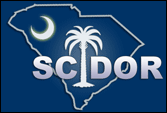

WorkWORLD
 |
 |
||||
| Get Latest WorkWORLD |
|||||
|
|
www.workworld.org |
workworld@vcu.edu |
 The Family Independence Tax Credit, administered by the South Carolina Department of Revenue, provides employers with a monthly tax credit when they hire recipients of Family Independence Program (FIP) payments. Employment must be full time (per South Carolina Code Section 12-6-3360); the qualifying "distressed counties" and "least developed counties" (see County Rankings below) are also defined in this section. The recipient of the FIP payments must have received the payments for the three months before becoming employed full-time.
The Family Independence Tax Credit, administered by the South Carolina Department of Revenue, provides employers with a monthly tax credit when they hire recipients of Family Independence Program (FIP) payments. Employment must be full time (per South Carolina Code Section 12-6-3360); the qualifying "distressed counties" and "least developed counties" (see County Rankings below) are also defined in this section. The recipient of the FIP payments must have received the payments for the three months before becoming employed full-time.
Employers are eligible for an income tax credit of:
· 20% of the wages paid to the employee for each full month of employment for the first twelve months of employment;
· 15% of the wages paid to the employee for each full month of employment during the second twelve months of employment;
· 10% of the wages paid to the employee for each full month during the third twelve months of employment.
The maximum aggregate credit that may be claimed in a tax year for a single employee is $5,500.00 for this credit and the Job Tax Credit except in a Distressed county where there is no cap.
Employers located in a Distressed or Least Developed county can also receive an additional $175 per month tax credit for each full month of full time employment during the first 36 months of employment of each qualifying employee, up to $2,100 for each qualifying year.
The Family Independence Tax Credit is not allowed unless the employer also makes available full individual or participating family health care coverage for the benefit of each qualified employee for which the credit is earned. The employer is not required to pay for all or part of any health insurance coverage for family independence payment recipients hired in order to claim the credit if the employer does not pay for all or part of health insurance coverage for any other employee. Employers must make health insurance available to a Family Independence Program recipient on the same basis and under the same conditions as any other employee.
An employer cannot terminate or force the resignation of an existing employee in order to create a vacancy to claim the Family Independence credit.
Employers must request documentation of FIP eligibility for employees from the South Carolina Department of Social Services in writing at the time of hire and no later than the fifteenth day after the end of the taxable year of the employer in which the Family Independence Program recipient was hired. The Department of Social Services has thirty days in which to either issue or deny this documentation.
Any unused credit may be carried forward for 15 years.
Percentages and amounts shown above were current as of March 2004.
The final ranking of counties for new, full time jobs created in tax years which begin in 2004, where the job tax credit was first earned after June 18, 2002, and increases in such jobs, is listed below for "Distressed" and "Least Developed" counties.
Chester
Chesterfield
Clarendon
Dillon
Hampton
Lee
Marion
Marlboro
McCormick
Orangeburg
Union
Williamsburg
Abbeville
Allendale
Bamberg
Barnwell
Cherokee
Edgefield
Fairfield
Georgetown
Jasper
Laurens
Saluda
Further information about these tax credits may be obtained by calling the S.C. Department of Revenue, Tax Credit Division at 803-898-5402.
South Carolina Code §12-6-3470 authorizes the Family Independence Tax Credit. It is available online at:
http://www.scstatehouse.net/code/t12c006.htm
For information on each taxable year for county classifications, and the links to the forms for filing the tax credit (SC SCH. TC-12 and SC SCH. TC-12-A), see the South Carolina Department of Revenue website at:
http://www.sctax.org/default.htm.
Family Independence Program - Employment and Training Requirements
Family Independence Program - Overview
South Carolina Tax Incentives for Economic Development, 2003 Edition, available at:
http://www.sctax.org/NR/rdonlyres/CF4103A2-C810-475D-8072-125A3C64B88F/0/TaxIncentive2003.pdf
Document titled "State and Federal Employment Related Tax Incentives Benefiting Employers & Individuals", created by Jim Love, Director and Milton Greene, Economic and Business Affairs, SC Department of Social Services made available to ESI as document file taxincentivematrix52503.doc.
WorkWORLD™ Help/Information System
![]() Share/Save: Click the button or link at left to select your favorite bookmark service and add this page.
Share/Save: Click the button or link at left to select your favorite bookmark service and add this page.
This is one topic from the thousands available in the WorkWORLD™ software Help/Information System.
Complete information about the software is available at: http://www.WorkWORLD.org
See How to Get WorkWORLD page at: http://www.WorkWORLD.org/howtogetWW.html
NOTE: Sponsored links and commercial advertisements help make the WorkWORLD™ website possible by partially defraying its operating and maintenance expenses. No endorsement of these or any related commercial products or services is intended or implied by the Employment Support Institute or any of its partners. ESI and its partners take no responsibility for, and exercise no control over, any of these advertisements or their views or contents, and do not vouch for the accuracy of the information contained in them. Readers are cautioned to verify all information obtained from these advertisements prior to taking any actions based upon them. The installed WorkWORLD software does not contain advertisements of any kind.
Copyright © 1996, 1997, 1998, 1999, 2000, 2001, 2002, 2003, 2004, 2005, 2006, 2007, 2008, 2009, 2010, 2011, 2012, Virginia Commonwealth University. All rights reserved.